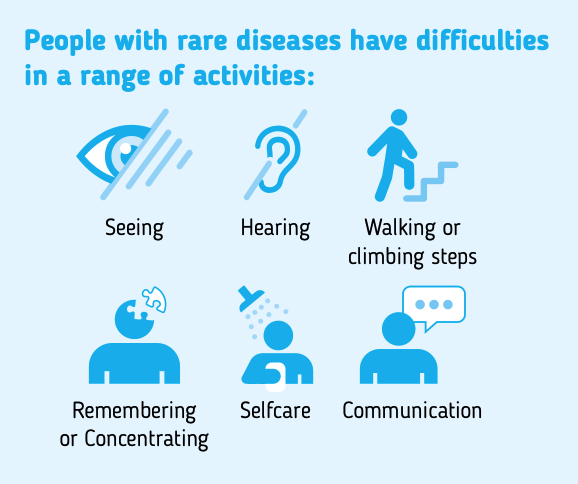- समाचार
Results of the Rare Barometer Survey 2025: Recognising Disabilities and Barriers
Published: 10 मार्च 2025
Key findings from the EURORDIS #RareBarometer survey on the impacts of living with a rare condition have now been finalised and can be accessed here. Conducted between July and September 2024, the survey gathered data from 9591 participants across Europe. We have been sent the Fragile X Syndrome responses as well as the general info.

पृष्ठभूमि
In Europe alone, 30 million people live with a rare condition. 8/10 people who live with a rare condition also live with a disability. Throughout their lives, they continue to face barriers that prevent them from fully participating in social life. Recognising these challenges they experience is the first step in moving towards a society where full social inclusion of these individuals is guaranteed. The Rare Barometer survey was designed to gain insight into the lives of people living with rare conditions and resulting disabilities, and the challenges they face in obtaining disability recognition and independent living support. It also explored the limitations they face in participating in society, including at school and work.
General Results of the Survey
People living with rare conditions live life with complex and diverse disabilities. Around 70% of these individuals live with invisible disabilities, and 25% of them live with visible disabilities as well. 80% live with frequent pain or fatigue. 64% reported that their disabilities were progressive and dynamic. Many felt that their disabilities were not adequately recognised by institutions especially schools and places and employment. The majority expressed negative experiences with obtaining adequate publicly funded support. 79% of participants who were students reported that their participation in education was limited.
Condition-specific Results: Fragile X Syndrome
The survey included 24 respondents who live with Fragile X Syndrome. All participants who live with Fragile X Syndrome also live with disabilities, and 96% reported that they have difficulties in completing at least 2 daily activities without support. 38% found that they had limited access to publicly funded support such as attendant care support, home support, financial support, assistive technology and mobility aids. 71% said that they experienced discrimination related to the rare disease or disability in healthcare, in employment, in education, in housing, in public accommodations or in other places.
The results of this survey show that the needs of those living with Fragile X Syndrome are not adequately recognised and supported, and that they face discrimination in many areas of their lives. Fragile X International will continue raising awareness on the benefit those living with FXS bring to society and work towards people getting the support they need to live the happiest lives possible.


